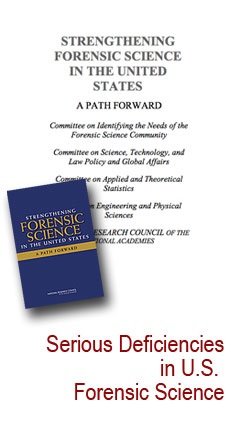Home | Glossary | Resources | Help | Course Map
In 2009, a report from the National Research Council (NRC) of the National Academy of Sciences (NAS) found serious deficiencies in the nation's forensic science system and called for major reforms and new research.
The report found a lack of:
- Current rigorous and mandatory certification programs for forensic scientists.
- Strong standards and protocols for analyzing and reporting on evidence.
- Evidence to support reliability of many techniques, such as fingerprint analysis.
- Peer-reviewed, published studies establishing the scientific bases and reliability of many forensic methods.
- Funding, staff or effective oversight at many forensic science labs.
Forensic evidence is often offered in criminal prosecutions and civil litigation to support conclusions about individualization — in other words, to "match" a piece of evidence to a particular person, weapon or other source. However, with the exception of nuclear DNA analysis, the NRC report says, no forensic method has been rigorously shown to be able to consistently, and with a high degree of certainty, demonstrate a connection between evidence and a specific individual or source.
According to the report, non-DNA forensic disciplines have important roles, but many need substantial research to validate basic premises and techniques, assess limitations, and discern the sources and magnitude of error. Even methods that are too imprecise to identify a specific individual can provide valuable information and help narrow the range of possible suspects or sources.
The report urged Congress to establish a new, independent National Institute of Forensic Science to lead research efforts, establish and enforce standards for forensic science professionals and laboratories, and oversee education standards.
In addition, the report indicates that, to ensure the efficacy of the work done by forensic scientists and other practitioners in the field, public forensic science laboratories should be independent from or autonomous within police departments and prosecutors' offices.
See: Forensic Professional Codes of Ethics and Conduct (Appendix)
Sources: 'Badly Fragmented' Forensic Science System Needs Overhaul; Evidence to Support Reliability of Many Techniques Is Lacking; and National Academy of Sciences Finds 'Serious Deficiencies' in Nation's Crime Labs.


